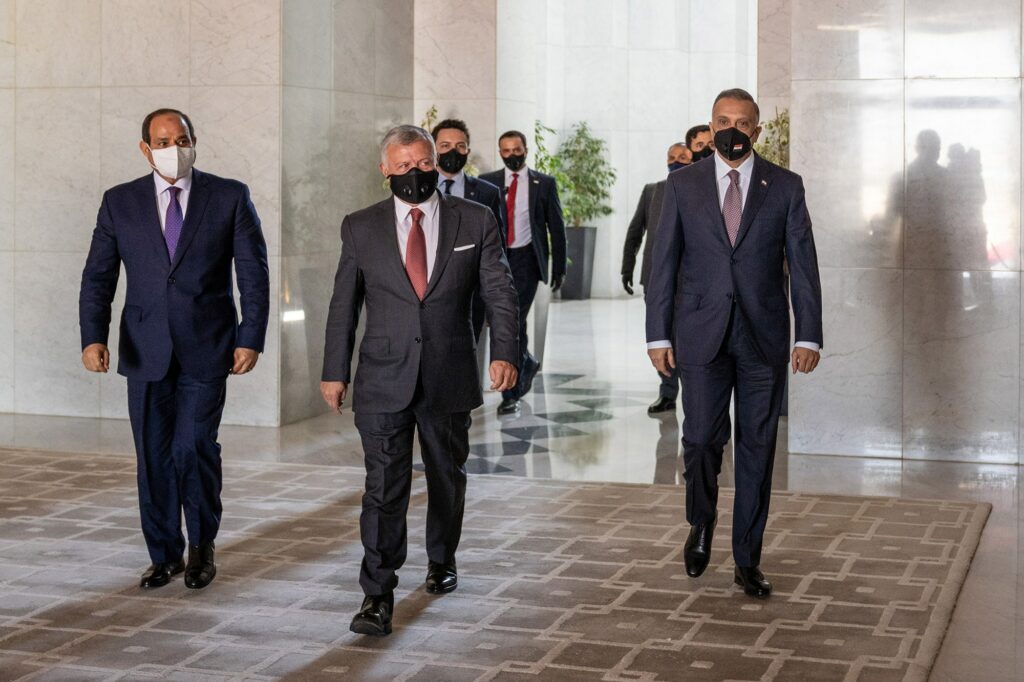A trilateral meeting between the leaders of Egypt, Iraq and Jordan was held in the Jordanian capital Amman last week. Regional issues and issues contributing to security and stability in the region were discussed at the summit, according to reports.
Holding this meeting can be important given that the recent events in the region are as closely related as the pieces of a puzzle. In this regard, the recent visit of Iraqi Prime Minister Mustafa al-Kazemi to Washington and the agreements reached between the two countries, and Al-Kazemi’s subsequent visit to the Jordanian capital Amman and meeting with King Abdullah II and Egyptian President Abdel Fattah al-Sisi can be analyzed as part of a series of new regional approaches.
The Zionist regime has now openly established relations with the UAE and a series of direct flights will be established between Tel Aviv and Abu Dhabi. In the next phase, Bahrain will probably have to normalize relations with the Israeli regime. In this regard, the visit of US Secretary of State Mike Pompeo to the region can be analyzed and evaluated in this context.
Pompeo traveled to Sudan, Occupied Palestine, Bahrain, the United Arab Emirates and the Kingdom of Oman in recent days, and a number of new scenarios are emerging. For example, the formation of a new Middle East based on the Arab-Hebrew-American structure, and Iraq in this roadmap must exit its ideological circle and enter the Hebrew-Arabic circle. For this reason, after Mustafa al-Kazemi’s visit to the United States, his office issued a statement saying that the relationship between the UAE and Israel depends on Abu Dhabi and has nothing to do with Iraq. This neutral stance is very thought-provoking in the current situation in the region.
Therefore, it seems that the visit of the Iraqi Prime Minister to Jordan and meeting with the King of Jordan and the President of Egypt is part of the efforts of Arab countries, especially the Arab League, to bring Iraq into the Arab-Hebrew camp. The aim of the Arab countries, especially Saudi Arabia, Jordan and Egypt, is to bring Iraq from the ideological realm to the atmosphere of Arab reaction and to increase the distance between Tehran and Baghdad politically and ideologically. Even the recent visit of the Saudi Foreign Minister to Baghdad is within this framework. Meanwhile, the main problem of the Arab countries is that Iraq is doomed to be in an ideological circle and this has become a problem for the Arab states because of the attitude and emotional view of the Iraqi people towards Iran.
As a result, these efforts are largely aimed at forming a new Middle East in which Iraq must have a foothold in order to form a broad Arab-Hebrew-American belt and front around Iran and so-called isolate the Islamic Republic. One of their main goals is to block Iraq’s gate of entry to Iran.
Therefore, it is not unexpected that these efforts and the Iraqi Prime Minister’s vision on the future of Baghdad to move closer to the Arab circle; However, we observed that a meeting was held on Friday at the home of Hadi al-Amiri, one of Iraq’s political leaders, with the participation of Al-Kazemi where influential figures warned the prime minister that he would be impeached by the parliament in the future if he made concessions to the United States.
In such a situation, the Iraqi Prime Minister, despite his inclination towards the Arab countries and the United States, must return to the ideological camp of the Iraqi people.
Finally, in the two months leading up to the US presidential election, the country appears to be pressuring the Arab states in the region and the Persian Gulf Cooperation Council states to forge closer ties with the Israeli regime. Pompeo’s visit to the Persian Gulf Arab states, the Occupied Territories, and Sudan was also aimed at helping Donald Trump use the issue as a trump card in the presidential election. Whereas the United States has now decided to distance itself from Iran’s friendly countries, given its failure to renew its arms embargo on Iran and its failure to involve its allies in activating the trigger mechanism; therefore, the holding of this tripartite meeting should be evaluated in line with US efforts to distance Iraq from Iran.










0 Comments